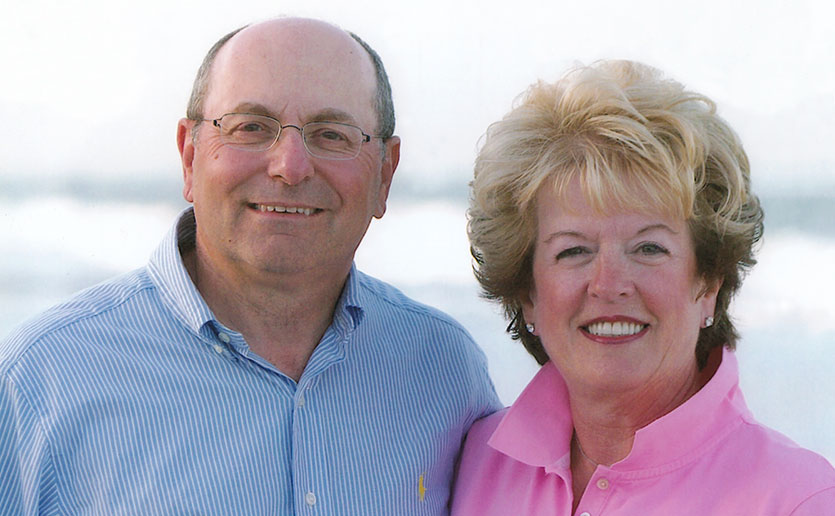What’s the impact of COVID-19 on the brain? That’s the charge of a new study launched by Massachusetts General Hospital’s Henry and Allison McCance Center for Brain Health. The study — funded by Paul and Kathleen Severino — will explore the effect of the novel coronavirus on the brain as well as the effect of treatment on the brain health of patients and their families.

Patients who recover from COVID-19 often report feeling anxious, difficulty concentrating and problems with their short-term memory. For patients who spent time in the ICU, the chance of developing these brain problems is even higher. But are these problems a neurological effect of the virus or a by-product of the treatment? Jonathan Rosand, MD, MSc, co-founder and co-director of the McCance Center and leader of the study, aims to find out.
“COVID-19 infection is a biological challenge to the brain, but the body’s response to the infection and the treatments we administer can also put patients at risk of brain problems,” he says. “Take our ICU patients — they’ve been cut off from their friends and family for days and sometimes weeks, attached to ventilators and heavily sedated — and most, if not all, of them are traumatized.” The Severino Family Initiative on Brain Health in Survivors of COVID-19 will help untangle the effects of the virus from the impact of the treatment to create what Dr. Rosand calls the “first natural history of our brains’ recovery from severe COVID-19.”
A Quick Pivot to COVID-19
As chief emeritus and founder of Mass General’s Division of Neurocritical Care and Emergency Neurology, Dr. Rosand built his reputation caring for patients with traumatic brain injuries, such as stroke and brain bleeds.
“It became clear to me over the course of my career that a huge factor in the recovery of these patients was their risk for developing depression, post-traumatic stress disorder, anxiety or other brain problems — conditions not necessarily related to the original injury,” he says. “I kept asking myself, why aren’t we intervening earlier to try to prevent these outcomes?”
“The people most impacted by the disease were from populations who can often be inadvertently overlooked in academic research.”
In 2019, Dr. Rosand stepped down from his role as chief to launch a new center aimed at taking a holistic, multidisciplinary approach to preventing brain disease. The McCance Center was still in its infancy when COVID-19 patients started arriving at Mass General. Dr Rosand and his colleagues quickly learned to manage critically ill patients unlike any they had seen before.
“We went from being a neuro ICU to a COVID ICU almost overnight,” Dr. Rosand says. The sickest patients were most frequently men from communities that were already at risk for healthcare disparities. “The people most impacted by the disease were from populations who can often be inadvertently overlooked in academic research.”
After recovery, many of these same patients began reporting signs of cognitive impairment. Family members of the patients were reporting similar symptoms. Dr. Rosand and his team were left wondering — were the symptoms specific to COVID-19 or the result of a confluence of related factors?
“COVID doesn’t occur in a vacuum,” Dr. Rosand says. “Many of these people are also facing financial pressures related to the virus, many have lost jobs, some have lost family members. To get a clear understanding, we needed to look at the whole picture.”
Catalytic Support
In early summer, Dr. Rosand shared his observations and the emerging research opportunity with philanthropists Paul and Kathleen Severino during a Zoom call. The couple agreed to fund the study with a leadership gift of $500,000.
“Dr. Rosand’s work offered us a unique opportunity to make a real difference in the fight against this virus and its impact on the brain,” says Paul Severino. “We are proud to support Mass General at this critical time.”
“The idea resonated with us, particularly because COVID-19 has had such a devastating impact on communities of color and immigrants here in Boston.”
The Severinos’ generosity enabled Dr. Rosand and his team to seize the moment and launch a systematic study of the impact of COVID-19 on brain health. One of the unique aspects of the study is that it puts special emphasis on the communities most affected by the disease.
“The idea resonated with us, particularly because COVID-19 has had such a devastating impact on communities of color and immigrants here in Boston,” says Kathy Severino. To better track the recovery and experience of these patients and their families, Dr. Rosand is assembling a bilingual and cross-cultural team of researchers.
“This gift has allowed us to build an infrastructure where we have contact with these populations that are often difficult to engage in clinical research,” says Dr. Rosand. In the months to come, the Severino Family Initiative team will interview patients and family members and collect a range of imaging, genetic and blood-based data.
“I believe this work is going to have a catalytic effect on our understanding of COVID and the brain,” he says.
To learn more about how you can support this effort or Mass General’s overall response to the COVID-19 pandemic, click here.


